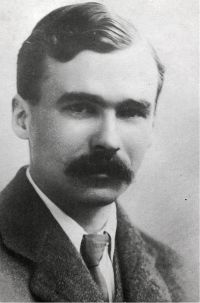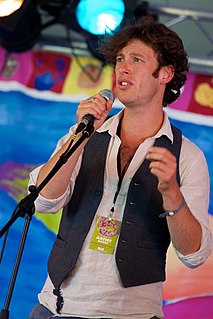 W
WSabine Baring-Gould of Lew Trenchard in Devon, England, was an Anglican priest, hagiographer, antiquarian, novelist, folk song collector and eclectic scholar. His bibliography consists of more than 1,240 publications, though this list continues to grow. His family home, the manor house of Lew Trenchard, near Okehampton, Devon, has been preserved as he had it rebuilt and is now a hotel. He is remembered particularly as a writer of hymns, the best-known being "Onward, Christian Soldiers", "Sing Lullaby", and "Now the Day Is Over". He also translated the carol "Gabriel's Message" from the Basque language to English.
 W
WGeorge Sainton Kaye Butterworth, MC was an English composer who was best known for the orchestral idyll The Banks of Green Willow and his song settings of A. E. Housman's poems from A Shropshire Lad.
 W
WFrancis Clive Savill Carey CBE, known as Clive Carey, was an English baritone, singing teacher, composer, opera producer and folk song collector.
 W
WArthur Foxton Ferguson an early-20th-century English baritone, lecturer, and German translator who founded The Folk-Song Quartet.
 W
WHenry Balfour Gardiner was a British musician, composer, and teacher.
 W
WPercy Aldridge Grainger was an Australian-born composer, arranger and pianist who lived in the United States from 1914 and became an American citizen in 1918. In the course of a long and innovative career he played a prominent role in the revival of interest in British folk music in the early years of the 20th century. Although much of his work was experimental and unusual the piece with which he is most generally associated is his piano arrangement of the folk-dance tune "Country Gardens".
 W
WMaud Karpeles was a British collector of folksongs and dance teacher.
 W
WFrank Kidson was an English folksong collector and music scholar.
 W
WSam Lee is a British folk singer and traditional music specialist. His debut album, Ground of its Own was shortlisted for the 2012 Mercury Music Award. Lee performs as part of an ensemble, Sam Lee and Friends.
 W
WRuth Herbert Lewis was an English temperance movement activist of Manx descent and collector of Welsh folk songs. She published collections of Welsh folk songs, and was a key member of the Welsh Folk-Song Society in the first half of the 20th century.
 W
WAlbert Lancaster Lloyd, usually known as A. L. Lloyd or Bert Lloyd, was an English folk singer and collector of folk songs, and as such was a key figure in the British folk revival of the 1950s and 1960s. While Lloyd is most widely known for his work with British folk music, he had a keen interest in the music of Spain, Latin America, Southeastern Europe and Australia. He recorded at least six discs of Australian Bush ballads and folk music.
 W
WErnest John Smeed Moeran was an English composer of part-Irish extraction, whose work was strongly influenced by English and Irish folk music of which he was an assiduous collector. His output includes orchestral pieces, concertos, chamber and keyboard works, and a number of choral and song cycles as well as individual songs.
 W
WThomas Percy was Bishop of Dromore, County Down, Ireland. Before being made bishop, he was chaplain to George III of the United Kingdom. Percy's greatest contribution is considered to be his Reliques of Ancient English Poetry (1765), the first of the great ballad collections, which was the one work most responsible for the ballad revival in English poetry that was a significant part of the Romantic movement.
 W
WJoseph Ritson was an English antiquary who was well known for his 1795 compilation of the Robin Hood legend. After a visit to France in 1791, he became a staunch supporter of the ideals of the French Revolution. He was also an influential vegetarianism activist.
 W
WSteve Roud is the creator of the Roud Folk Song Index and an expert on folklore and superstition. He was formerly Local Studies Librarian for the London Borough of Croydon and Honorary Librarian of the Folklore Society.
 W
WCecil James Sharp was an English-born musician and composer who was a key leader of the folk-song revival in England as a collector, archivist, teacher and promoter. He gathered thousands of tunes both from rural England and the Southern Appalachians region of the United States, and wrote an influential volume, English Folk Song: Some Conclusions.
 W
WLaura Alexandrine Smith (1861-1902) was an English musician, ethnomusicologist and one of the earliest collectors of sea shanties. Smith’s The Music of the Waters, published in 1888, was possibly the first collection of sea shanties to include music as well as words.
 W
WRalph Vaughan Williams was an English composer. His works include operas, ballets, chamber music, secular and religious vocal pieces and orchestral compositions including nine symphonies, written over sixty years. Strongly influenced by Tudor music and English folk-song, his output marked a decisive break in British music from its German-dominated style of the 19th century.
 W
WPhilip Arnold Heseltine, known by the pseudonym Peter Warlock, was a British composer and music critic. The Warlock name, which reflects Heseltine's interest in occult practices, was used for all his published musical works. He is best known as a composer of songs and other vocal music; he also achieved notoriety in his lifetime through his unconventional and often scandalous lifestyle.